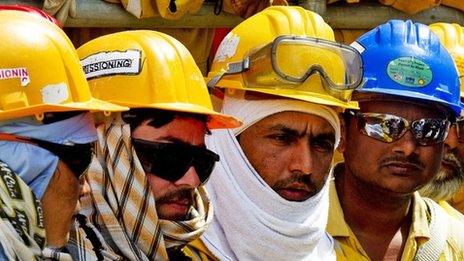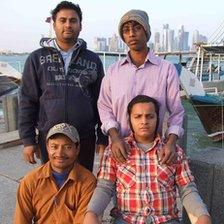Migrant workers flock to Qatar
- Published

Qatar has been built by ever-rising numbers of foreign workers
If any country encapsulates the life of the foreign worker, then Qatar is surely it.
Just a few decades ago the tiny Gulf state was the region's most sleepy outpost, known for pearl trading, and not much else.
Now it boasts a modern capital city, enormous industry thanks to its vast gas reserves, and is gearing up to host the World Cup in 2022.
This phenomenal development has only been possible because of one key resource: migrant workers.
Qatar is a country that has been built by foreigners - a veritable army of workers have been brought in to build its bridges, run its companies and clean its streets.
In the past decade, Qatar's population has tripled.
But for every five people living here, only one is a native Qatari. Put simply, Qataris are outnumbered in their own country.
Lure of money
The reason migrant workers flock here is opportunity.
For lower-paid workers, Qatar offers something life in Asia or Africa cannot, namely a job, regular income and the ability to support a family back home.
For white-collar workers, Qatar offers better career prospects, higher salaries and tax-free living.
Everyone has their price, and as long as Qatar continues to pay, migrant workers will continue to come.
Dhan Baruwal is from Nepal, and came to Qatar when he was just 18.
He began life here as an unskilled labourer, but has now worked his way up to become utilities supervisor on a construction site in Doha.
He is honest about why he came here - money was the main lure, he says.
"In Nepal, even if you find a job, you can only earn $150 a month," he says.
"But here I can get $700 a month. That's why I like it."
Like most migrant workers, Mr Baruwal, now 24, is supporting his family back home.
Two younger sisters and a brother are going to school thanks to his regular cash transfers home, and his parents - who as teachers earn very small salaries - are being supported too.
First step up
For others, life here is a stepping stone towards something better.
Dan Pascut left his native Romania a year ago because of the poor economic situation there, and says there are simply not enough good jobs for all the graduates the country is producing.
Mr Pascut holds a masters degree in business management, but for now is content to work as a valet parker at a 5-star hotel in Doha.
"For me, this is just the first step," he says.
"Working in a hotel chain, you get a lot of opportunities. The hotel industry offers the chance to start low, but to grow within the company and put into practice everything you have learned at university."
Mr Pascut finds it difficult to be separated from his family and he misses traditional Romanian food, but like most people here in Qatar he does not plan to go home any time soon.
"If my contract finishes here, I'll look again for work abroad, in the US maybe or here in the Middle East," he says.
"I want to see the world and live in different environments. I just want to work outside Romania to experience something different."
For Italian Elisa Grimaldi, 34, a recruitment consultant in the oil and gas industry, Qatar is the place to be right now.
"I work in the energy sector and Qatar is one of the biggest gas exporters in the world, so for a professional like me it's an attractive place," she says.
"This is a rich country, people are coming from right around the world to be here and there's just so much opportunity."
No bills
Like everyone here, the pull factor for Ms Grimaldi is money.

Qatar's army of workers do everything from bridge building to running companies to cleaning the streets.
"In my country I wouldn't be able to buy a house, or probably it would take me around 30 years. But here, in five years you can put together money to buy a house or a nice flat in a European city.
"Everybody here is saving money and that's mainly because we don't pay bills," she adds.
"Fuel is very cheap, help at home is reasonable, and we get housing provided so we don't have to pay rent.
"We probably earn similar salaries to at home - maybe a little higher - but we don't really spend anything, so basically everything is for your pocket."
Ms Grimaldi realises she's extremely lucky to be working in the Gulf, especially when she considers the situation in her native Italy.
"I can read in the eyes of my friends back home that some of them are not happy," she says.
"If you have a job in Italy you are lucky, but it's difficult to change jobs and there are no opportunities, and many people are unsatisfied professionally.
"It's very frustrating because my friends and former colleagues have the same - if not more - knowledge than me, but I managed to get more opportunity, just because I was brave enough to leave."
- Published2 December 2011
- Published26 November 2011
- Published17 November 2011
- Published17 November 2011